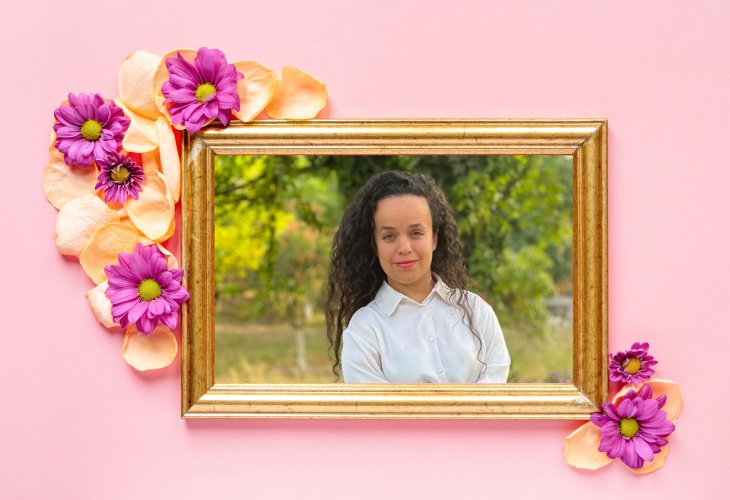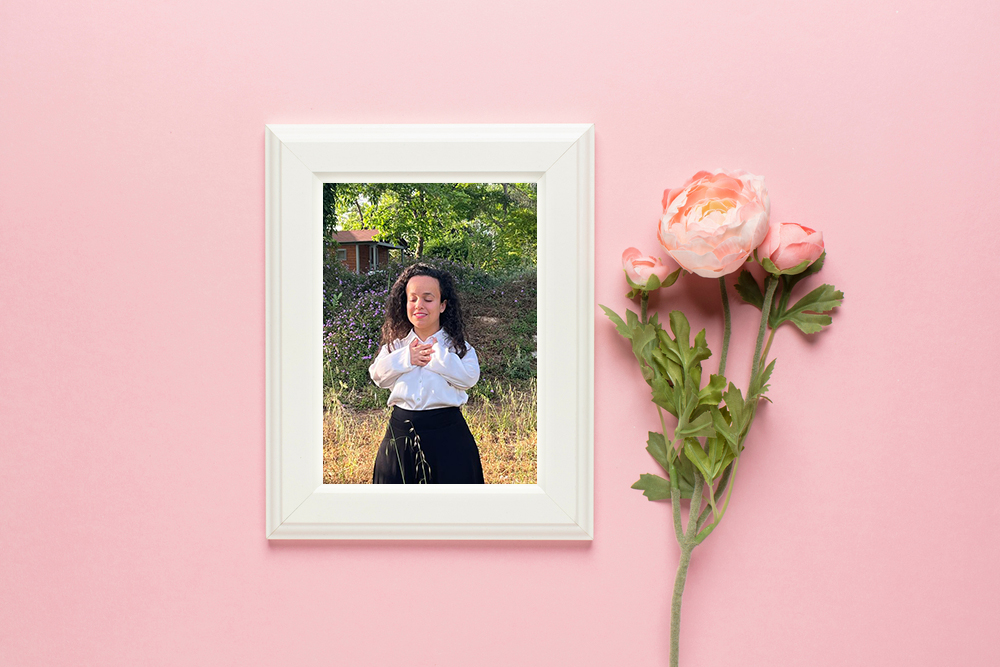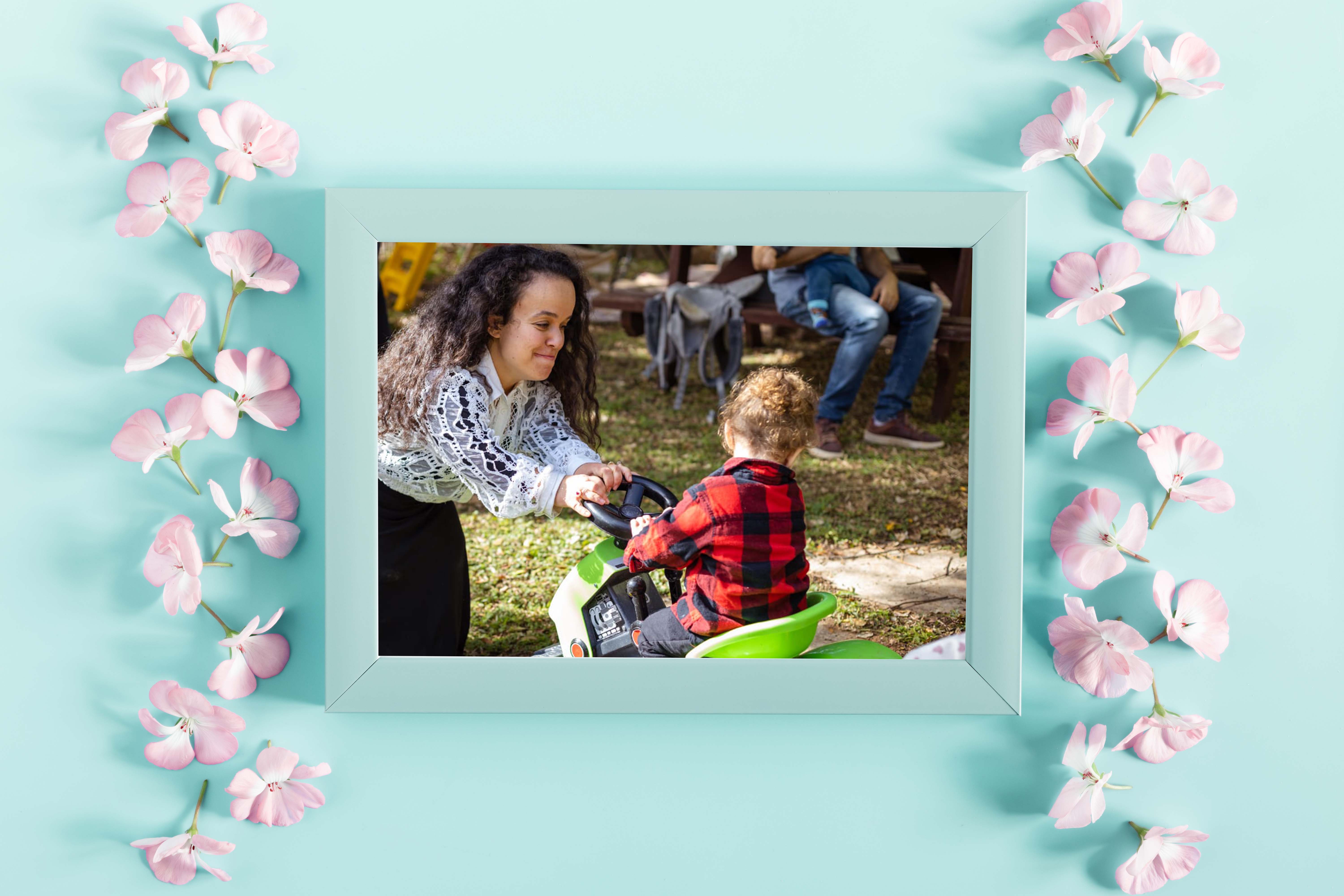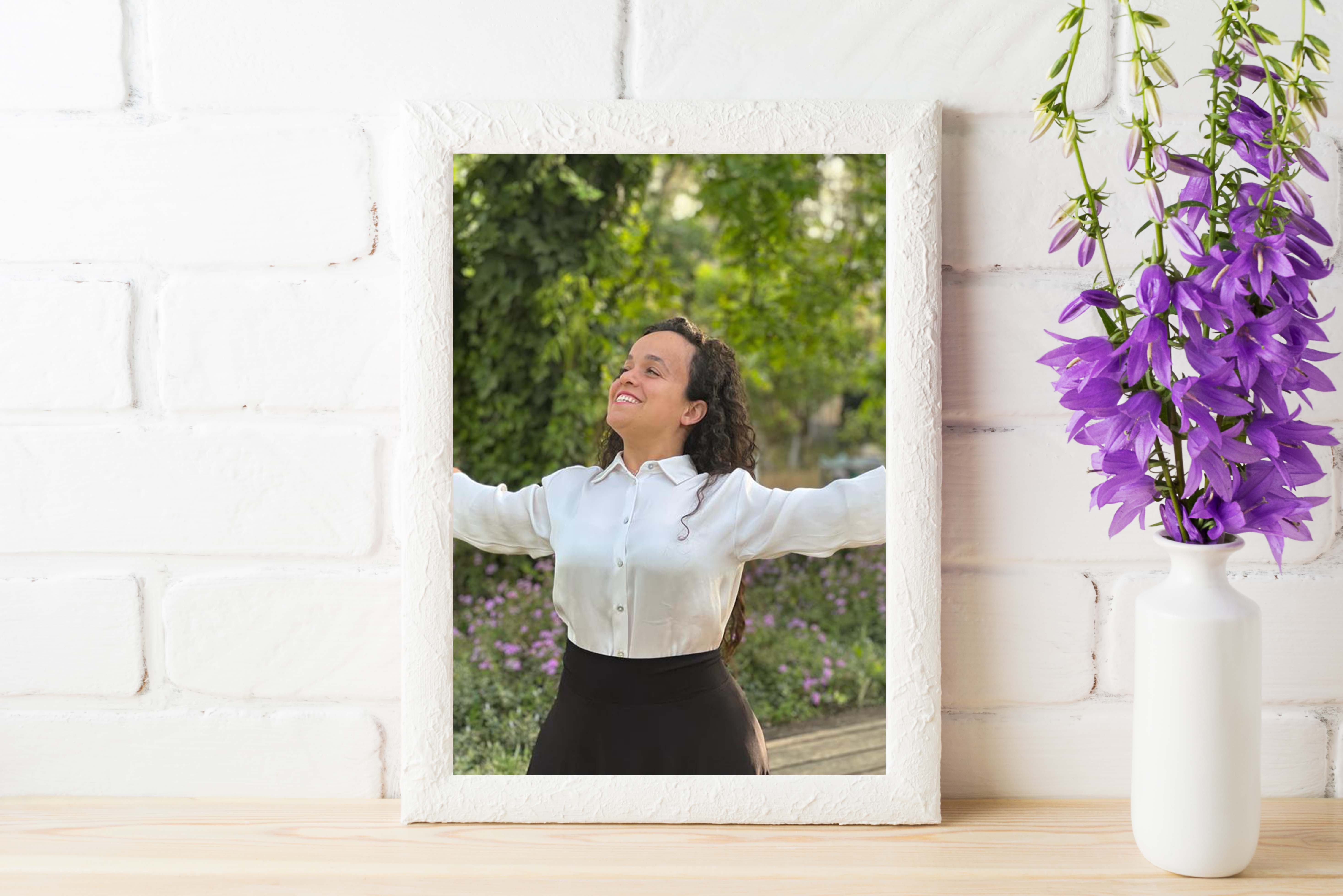"Doctors Said: There's a Fifty Percent Chance Your Child Will Be Short Statured Like You"
She was born with dwarfism, yet it never stopped her from breaking every glass ceiling possible: performing on stages from a young age, becoming a DJ at Galgalatz, and even giving a TED talk. Still, if you ask her, the real pinnacle of her life is the miracle of her son's birth and her return to faith inspired by him. Actress Bat-El Bornstein in a special interview.
 Bat-El Papura
Bat-El PapuraAnother typical afternoon. Four-year-old Bat-El Bornstein (then Papura) leaves the house to play with neighborhood children. Seeing her approach, they start laughing and call her 'dwarf.' Swallowing the stubborn tears rising in her throat, she holds back from crying. "In this neighborhood, I knew, if you cry—better to move to another country," she describes. A little later she returns home, seeking to unload the deep insult she experienced outside, sharing with her mother the harsh conclusion from her short life experience: it's safer at home. It's dangerous out there. But her mother chooses to respond entirely differently: she looks at her with a firm expression and decisively says: "Bat-El, go back outside now and don't come back until you've found at least two new friends. Don't try to enter the house before then. I will lock the door."
These words begin our interview. These words also begin the lecture that Bornstein delivers to crowds coming especially to watch her. And one could say, these words embody her life's philosophy: zero self-pity.
Years have passed, and together with them, Bornstein has remarkably transformed. "Even if a doctor came today and promised me a surgery or any medical procedure that could make me 'normal'—I wouldn't trade my height anymore. It's the best thing that happened to me," she responds firmly. And believe it or not, it seems to be entirely true for her.
"If I Were Average Height—We Wouldn't Be Talking": Bat-El in an Interview on the Difference That Became a Success
"Don't Let Your Height Diminish Your Dreams"
Bornstein was born in Romania to two parents who were dentists by profession. She spent her childhood in Kiryat Yam after immigrating to Israel with her mother. She grew up in a secular, liberal home, "on the verge of atheism," as she defines it.
At birth, she was diagnosed with achondroplasia, which means a genetic defect causing dwarfism. Individuals with this defect have arms and legs that are relatively short, while their torso is of normal length for their age. However, in the Russian-influenced home she grew up in, there were never any allowances made: Bornstein never received any support from her mother for self-pity, even when society outside mocked her. Moreover, her mother always encouraged her to realize herself and not let her height diminish her dreams or her expectations from herself.

The dream was clear: from a young age, she aspired to be an actress and perform on stages. In middle school and high school, she studied theater, ballet, and voice development, and even then, she experimented with acting and stood out positively.
Then came military service. Due to her condition, the army refused to enlist her, but Bornstein did not give up and entered through the back door: she asked to volunteer. Initially, she served as a welfare NCO, but quickly found her way due to her talent to become a DJ at Galatz and later at Galgalatz.
Later, she studied acting at the Nissan Nativ Acting Studio and acted at leading theaters in Israel: Gesher, the Cameri, and more. In 2014, while all cultural events closed due to Operation Protective Edge and Bornstein experienced a financial and personal crisis, she decided to leverage it and embark on an independent career. Then she first created her own personal show, called "I Am Bat-El," which presents her personal story through touching on sensitive topics like body image, self-image, and self-confidence, issues she has dealt with her entire life. Since then, she has performed in almost 1,000 shows(!), and the show has achieved great success in Israel and around the world, in front of diverse audiences. At some point, she was even chosen to give a TED talk.
"Before I strengthened my faith, the focus of my performances was belief in good, belief in people, belief in myself. Today it has changed," she describes.
"David's Birth is Also My Rebirth"
Nearly three years ago, Bornstein experienced a special enlightenment that changed her life: a year and a half after marrying her husband, Nir Bornstein, Bat-El discovered, to her surprise, she was pregnant. For women with her condition, pregnancy can be a dangerous and complex experience, and even getting pregnant itself is not easy in many cases. Not to mention the newborn baby, who always has a 50% chance of inheriting the same syndrome as the mother. But as it continued, Bornstein felt how the divine providence was smiling at her. "I had a fantastic pregnancy," she describes. "Everything was extremely easy. I exercised throughout the pregnancy, was calm and happy, my body responded well to all these changes, and I gave birth by scheduled C-section, because that's the protocol for women with achondroplasia, so I didn't even experience labor pains. I just set an appointment, and it was very sterile and pleasant, by the book."

But then things began to complicate. "In the delivery room, they couldn't anesthetize me," she describes. "They poked my back four times with an epidural, and at some point, I started feeling distress, so David was born with oxygen deficiency and was hospitalized for two weeks in intensive care to stabilize his condition. It was very hard; as a mother, I couldn't even touch him, and it was a real shock and helplessness on one hand. Then I understood how much a birth, especially with full hands, is a miracle. How many miracles and divine providence one needs, to enter this with a sacred reverence that's not understood by people. On the other hand, in all this 'madness,' I had a deep connection with Hashem and felt a deep sense of faith that everything would be alright."
Following this birth, Bornstein describes going through what she defines as a "quantum leap." "Even before, I was spiritual; I even had a spiritual coach, and I read books on the subject, but something with David's birth changed everything. He was born on a Wednesday, and by the Shabbat following, I was already observing it, and it was clear that this would happen naturally. It was the first Shabbat I've ever observed in my life.
Moreover, within this challenging experience, specifically within the hospital walls, the divine providence arranged special encounters for Bornstein that strengthened her spirit. "I met women there I would never have met: a Chabad woman who gave me a card with a prayer from Psalms, or a Gur Hasidic woman, despite the huge gap between us, we got very close, and I was very impressed by her. She was only 22, and I was 31, ten years apart, and she had already been with her child in the neonatal intensive care for three months, yet she was always happy, confident, and calm that Hashem was watching over her child. It was amazing. Probably no other situation would have brought us together and given me the privilege to meet them.
The newborn was named David by the couple without any hesitation. "He was in the incubator, and I sat next to him, reading Psalms all the time. And all the chapters start with the word 'of David,' and that's exactly how I felt. Reading Psalms for my child, for David. And also King David.
"Whenever I recall these moments, I realize how David's birth developed me," she describes. "And I am convinced that every woman, in every birth, as written in the Torah: a woman sits on the birth stool. She breaks down and is rebuilt anew, the vessel is rebuilt anew. Change is sometimes accompanied by pain, but one doesn't have to fear this pain. Certainly, when you have faith. Because I knew Hashem was with me and loved me and was with me, I understood there was something for me to learn, and then this whole challenging experience was much more relaxed for me, while I saw how people around me who were not believers became broken vessels.
"When I reflect on it overall, I believe I wouldn't have reached all the good things in my life if I hadn't gone through difficulties and crises and hadn't had insights from that place. The strongest insight I came out with from this birth is how much a person is limited. It's important to believe in yourself, but if you rely on a person—it won't work, there's a limit to what a person can do alone. Only Hashem is limitless, He is omnipotent, and when you rely on Him—you don't fear anyone anymore, and in my opinion, that's a solution to the anxiety that many of us suffer from."
"A Siddur? I Saw One for the First Time Two Years Ago"
Since then till today, something entirely new has opened in Bornstein's life, and anyone who knows her will attest to it. "It's rare to have something in adult life that 'blows your mind' like this," she laughs. "It happens very few times. I feel that it's not interesting to talk about anything else anymore; the most interesting thing to me is to grow in and pass on only faith. And I didn't grow up in a believing environment. For example, I saw a siddur for the first time in my life only two years ago... but my personal dialogue with Hashem has always been there. It's something in the soul that you know even as a child. I remember myself praying and asking and really knowing. And I believe everyone has that, even the biggest cynics. And everyone, no matter their background, has the right to know Hashem. Faith is a significant part of our fulfillment.
"Overall, it manifests in me being a much more peaceful person than I was, much more aware and excited by flowers and trees and really feeling Hashem in everyday life. I also have falls and sadness like everyone else, but overall I am a whole person and appreciative. My aspirations, my priorities have changed dramatically. My greatest aspiration today is to grow spiritually. Even my perception of our family's togetherness is different, there's suddenly a desire for the Shechina (Divine Presence) to be in our home. I'm not even thinking about my career and everything else, because when you're in faith, everything comes anyway.
"In practice, I observe Shabbat, don't work on Shabbat, don't travel on Shabbat, don't eat non-kosher, teach David blessings, washing hands, the 'Shema Yisrael,' holidays. I read and study spiritual books by Rabbi Steinsaltz, Rabbi Yuval Asherov, Rabbi Shalom Arush, and others.
"And regarding attire, modesty is a topic that interests me greatly, because it's something that comes from within. You can't impose it on anyone, certainly not on a woman who didn't grow up that way, this thing. It distances. I'm proud of how I look and don't hide it, but today, I think for example that a neckline is very confusing to the energy, and it's more important to me that people hear what I have to say rather than get confused. I dress in a more respectful manner; I'm not comfortable with necklines. But it came from inside me, and I felt it physically, on my skin, that I can't dress like that anymore, I'm not comfortable. And it's entirely personal."
How did your husband Nir react to this entire change? After all, you made a choice that also affects him significantly.
"Nir is a wonderful and open person, perhaps the most open I know, and he respects me very much on this matter. We don't light fire, don't travel, mostly my husband as well. As a family. And today, it’s also a situation that it’s not that bad that your wife observes Shabbat because there’s Kiddush and very tasty food, and I also respect him with the phone and the PlayStation. It won't help if I impose it on him. On the other hand, we do ensure that David doesn’t watch TV, and this is agreed upon between us. I can't impose my certain level on him."
"Livelihood Grows Out of Faith"
What kind of reactions are you getting for this change from your audience, in general?
"I have a Facebook page with 50 thousand followers, and they're used to certain content and the content has changed, and people are thirsty for it, everyone wants the connection to Hashem and thirst for it. I’ve just released a video of 'Blessed is He Who Made Me According to His Will,' and within three days it reached over 100 thousand views. We all know the Torah and forgot it, we all want to be happy and peaceful and have faith. As for my crowd, it’s hugely positive.
"As for the family, I was very concerned about their reactions, that I'd be closing the phone, or that we wouldn’t attend various events and family gatherings on Shabbat, and that's the beauty of faith, that Hashem arranges them, and these things go over very smoothly. They understand and accept it deeply, I’ve never experienced a confrontation over it. To me, someone who argues with you is very curious and wants to know why yes, but I don’t argue, you need to want it from within you," she laughs.

For a successful actress like you, it's surely not easy to take such a step. Aren't you afraid it will affect your career?
"On the contrary, it's only upgrading my career! For example, I filmed a series with three seasons, and today I feel that I don't want to be there, and I told them I won't do the fourth season, I’m not there anymore. And I'm not afraid. I completely think that my next content, whether it's a book or a show, will be empowerment from faith and confidence, and my tools will upgrade to those of faith, which is my heart's desire, and that's what I want to convey and what interests me—how to live in empowerment and confidence from the place of knowing Hashem.
"In fact, I think even more livelihood will come from this faith. Hashem has blessed me with the ability to convey content, to bring closer, that this change is development, one cannot remain stagnant all the time. What does not change—dies. One must grow, develop. My biggest aspiration is to know Hashem and strengthen in faith. I feel stronger physically and mentally, stronger in confronting life, not afraid of anything, because I have faith. There’s something in faith that releases my anxiety about livelihood. Livelihood is not related to you and your actions, but to your connection with Hashem."

